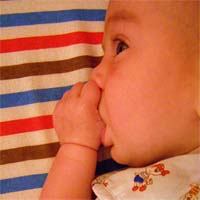Thumb-sucking is a natural comfort response for babies and small toddlers, but for decades dentists and orthodontists have feared the repercussions of extended thumb-sucking. Experts note that when thumb-sucking continues as children begin to develop permanent teeth, it can later the structure of their jaw and incur long-term damage. It may also affect their speech.
Medical and psychological experts say the urge to discontinue sucking one’s thumb begins to occur around six months of age, but in some children the comfort factor may carry on for years.
England’s answer? The first thumb-sucking clinic.
Breaking the thumb-sucking habit can be frustrating for parents, who try bitter tasting, non-toxic ointments that often do little to deter children from popping their thumb into their mouths.
The West London clinic plans to employ a variety of habit-breaking techniques, including metal mouth guards and thumb covers designed to remind children they shouldn’t be sucking their thumb.
 Experts say caution does need to be taken when trying to break the thumb-sucking habit, as most children who suck their thumbs long-term do so to achieve a certain level of psychological comfort. Forcing them to stop could result in an even worse habit, for example, bed-wetting, which definitely requires more patience on behalf of parents than thumb-sucking. Instead of using threats about damage to a child’s teeth, incentives will have a greater and more positive overall impact.
Experts say caution does need to be taken when trying to break the thumb-sucking habit, as most children who suck their thumbs long-term do so to achieve a certain level of psychological comfort. Forcing them to stop could result in an even worse habit, for example, bed-wetting, which definitely requires more patience on behalf of parents than thumb-sucking. Instead of using threats about damage to a child’s teeth, incentives will have a greater and more positive overall impact.
I am among the fortunate few whose child barely sucked her thumb, even as a tiny infant. She had very little interest in pacifiers either, so breaking the sucking habit was a snap for me. I have seen parents who struggle with their kids, fear and worry over their future orthodontic bills pushing them to do whatever it takes to break the habit.
Now, if I could just find a clinic that specializes in teenage nail-biting… Anyone?
